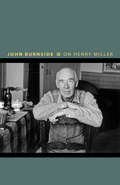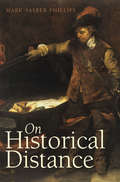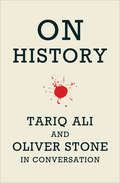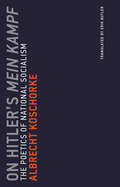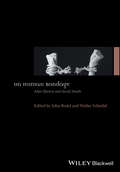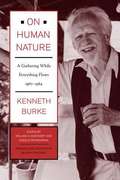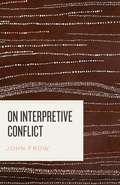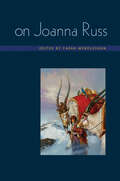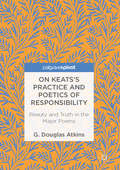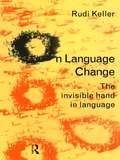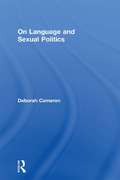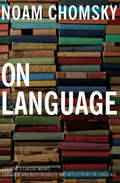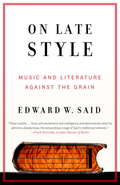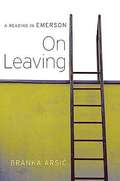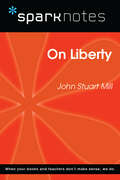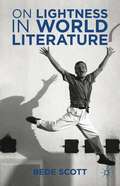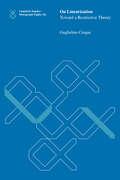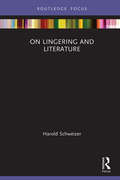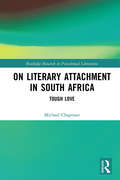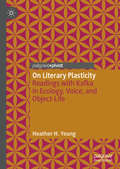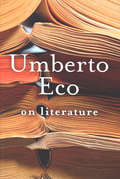- Table View
- List View
On Hawthorne: The Best from American Literature
by Louis J. Budd Edwin H. CadyFrom 1929 to the latest issue, American Literature has been the foremost journal expressing the findings of those who study our national literature. The jouranl has published the best work of literary historians, critics, and bibliographers, ranging from the founders of the discipline to the best current critics and researchers. The longevity of this excellence lends a special distinction to the articles in American Literature.Presented in order of their first appearance, the articles in each volume constitute a revealing record of developing insights and important shifts of critical emphasis. Each article has opened a fresh line of inquiry, established a fresh perspective on a familiar topic, or settled a question that engaged the interest of experts.
On Henry James: The Best from American Literature
by Louis J. Budd Edwin H. CadyFrom 1929 to the latest issue, American Literature has been the foremost journal expressing the findings of those who study our national literature. American Literature has published the best work of literary historians, critics, and bibliographers, ranging from the founders of discipline to the best current critics and researchers. The longevity of this excellence lends a special distinction to the articles in American Literature. Presented in order of their first appearance, the articles in each volume constitute a revealing record of developing insights and important shifts of critical emphasis. Each article has opened a fresh line of inquiry, established a fresh perspective on a familiar topic, or settled a question that engaged the interest of experts.
On Henry Miller: Or, How to Be an Anarchist (Writers on Writers)
by John BurnsideAn engaging invitation to rediscover Henry Miller—and to learn how his anarchist sensibility can help us escape “the air-conditioned nightmare” of the modern worldThe American writer Henry Miller's critical reputation--if not his popular readership—has been in eclipse at least since Kate Millett's blistering critique in Sexual Politics, her landmark 1970 study of misogyny in literature and art. Even a Miller fan like the acclaimed Scottish writer John Burnside finds Miller's "sex books"—including The Rosy Crucifixion, Tropic of Cancer, and Tropic of Capricorn—"boring and embarrassing." But Burnside says that Miller's notorious image as a "pornographer and woman hater" has hidden his vital, true importance—his anarchist sensibility and the way it shows us how, by fleeing from conformity of all kinds, we may be able to save ourselves from the "air-conditioned nightmare" of the modern world.Miller wrote that "there is no salvation in becoming adapted to a world which is crazy," and in this short, engaging, and personal book, Burnside shows how Miller teaches us to become less adapted to the world, to resist a life sentence to the prison of social, intellectual, emotional, and material conditioning. Exploring the full range of Miller's work, and giving special attention to The Air-Conditioned Nightmare and The Colossus of Maroussi, Burnside shows how, with humor and wisdom, Miller illuminates the misunderstood tradition of anarchist thought. Along the way, Burnside reflects on Rimbaud's enormous influence on Miller, as well as on how Rimbaud and Miller have influenced his own writing.An unconventional and appealing account of an unjustly neglected writer, On Henry Miller restores to us a figure whose searing criticism of the modern world has never been more relevant.
On Historical Distance
by Mark Salber PhillipsConceptions of distance are foundational to historical thought, but Mark Salber Phillips gives the idea new subtlety and meaning. He argues that distance is a matter not just of time and space but also of form, affect, ideology, and understanding. In this exceptionally wide-ranging study, Phillips examines Renaissance, Enlightenment, and contemporary histories, as well as a broad spectrum of historical genres--including local history, literary history, counter-factual fiction, history painting, and museology."On Historical Distance is a fascinating and very important book that should be read by all historians. Beautifully written in elegant, economical and engaging prose, the book wears its considerable learning very lightly. A deeply original, challenging and thought-provoking study of the evolving history of history by one of our leading historians of historiography, this book should provoke a lively debate among historians and should be assigned as essential reading for classes on historical methods and historiography."--John Marshall, John Hopkins University
On History: Tariq Ali and Oliver Stone in Conversation
by Tariq Ali Oliver StoneThese prominent filmmakers, &“two of our most provocative and radical voices,&” discuss American historical events that have been forgotten—or hidden (Katrina vanden Heuvel, editor of The Nation). In working together on two challenging documentaries—South of the Border and the Untold History of the United States series for Showtime—filmmaker Oliver Stone engaged with author and filmmaker Tariq Ali in a probing, hard-hitting conversation on the politics of history. Their dialogue brings to light a number of forgotten—or deliberately buried—episodes of American history, from the US intervention against the Russian Revolution to the dynamic radicalism of the Wobblies; to how Henry Wallace&’s nomination for the vice presidency was deliberately thwarted by Democratic Party machine insiders; to the ongoing close connections between various US presidents and the Saudi royal family. For Stone, an Academy Award–winner, and Ali, an acclaimed novelist and journalist—two of our most insightful observers on history and popular culture—no topic is sacred, no orthodoxy goes unchallenged.
On Hitler's Mein Kampf: The Poetics of National Socialism (Untimely Meditations #2)
by Albrecht KoschorkeAn examination of the narrative strategies employed in the most dangerous book of the twentieth century and a reflection on totalitarian literature. Hitler's Mein Kampf was banned in Germany for almost seventy years, kept from being reprinted by the accidental copyright holder, the Bavarian Ministry of Finance. In December 2015, the first German edition of Mein Kampf since 1946 appeared, with Hitler's text surrounded by scholarly commentary apparently meant to act as a kind of cordon sanitaire. And yet the dominant critical assessment (in Germany and elsewhere) of the most dangerous book of the twentieth century is that it is boring, unoriginal, jargon-laden, badly written, embarrassingly rabid, and altogether ludicrous. (Even in the 1920s, the consensus was that the author of such a book had no future in politics.) How did the unreadable Mein Kampf manage to become so historically significant? In this book, German literary scholar Albrecht Koschorke attempts to explain the power of Hitler's book by examining its narrative strategies. Koschorke argues that Mein Kampf cannot be reduced to an ideological message directed to all readers. By examining the text and the signals that it sends, he shows that we can discover for whom Hitler strikes his propagandistic poses and who is excluded. Koschorke parses the borrowings from the right-wing press, the autobiographical details concocted to make political points, the attack on the Social Democrats that bleeds into an anti-Semitic conspiracy theory, the contempt for science, and the conscious attempt to trigger outrage. A close reading of National Socialism's definitive text, Koschorke concludes, can shed light on the dynamics of fanaticism. This lesson of Mein Kampf still needs to be learned.
On Howells: The Best from American Literature
by Louis J. Budd Edwin H. CadyFrom 1929 to the latest issue, American Literature has been the foremost journal expressing the findings of those who study our national literature. The jouranl has published the best work of literary historians, critics, and bibliographers, ranging from the founders of the discipline to the best current critics and researchers. The longevity of this excellence lends a special distinction to the articles in American Literature.Presented in order of their first appearance, the articles in each volume constitute a revealing record of developing insights and important shifts of critical emphasis. Each article has opened a fresh line of inquiry, established a fresh perspective on a familiar topic, or settled a question that engaged the interest of experts.
On Human Bondage: After Slavery and Social Death (Ancient World: Comparative Histories)
by Walter Scheidel John BodelOn Human Bondage—a critical reexamination of Orlando Patterson’s groundbreaking Slavery and Social Death—assesses how his theories have stood the test of time and applies them to new case studies. Discusses the novel ideas of social death and natal alienation, as Patterson first presented them 35 years ago and as they are understood today Brings together exciting new work by a group of esteemed historians of slavery, as well as a final chapter by Patterson himself that responds to and expands upon the other contributions Provides insights into slave societies around the world and across time, from classical Greece and Rome to modern Brazil and the Caribbean, and from Han China and pre-colonial South Asia to early modern Europe and the New World Delves into a wide range of topics, including the reformation of social identity after slavery, the new historicist approach to slavery, rituals of enslavement and servitude, questions of honor and dishonor, and symbolic imagery of slavery
On Human Nature: A Gathering While Everything Flows, 1967-1984
by Kenneth Burke William H. Rueckert Angelo BonadonnaAfter 1966, Kenneth Burke certainly changed what he was doing. There were no more text-centered analyses. He tended to write to a request or a conference or seminar topic of some kind. He relentlessly explains and applies logology; and just as relentlessly "attacks" hyper-technologism for the ways in which it is polluting the globe and threatening us in other ways.
On Interpretive Conflict
by John Frow“Interpretation” is a term that encompasses both the most esoteric and the most fundamental activities of our lives, from analyzing medical images to the million ways we perceive other people’s actions. Today, we also leave interpretation to the likes of web cookies, social media algorithms, and automated markets. But as John Frow shows in this thoughtfully argued book, there is much yet to do in clarifying how we understand the social organization of interpretation. On Interpretive Conflict delves into four case studies where sharply different sets of values come into play—gun control, anti-Semitism, the religious force of images, and climate change. In each case, Frow lays out the way these controversies unfold within interpretive regimes that establish what counts as an interpretable object and the protocols of evidence and proof that should govern it. Whether applied to a Shakespeare play or a Supreme Court case, interpretation, he argues, is at once rule-governed and inherently conflictual. Ambitious and provocative, On Interpretive Conflict will attract readers from across the humanities and beyond.
On Joanna Russ
by Farah MendlesohnJoanna Russ, a feminist writer best known for The Female Man (1975), has produced a fierce, intense body of fiction and essays whose influence has been wide-ranging and complex. Her many publications include How to Suppress Women's Writing (1983), and she has won both of science fiction's most prestigious awards, the Nebula and the Hugo. The essays in this volume examine every aspect of Russ's body of work and provide a critical assessment that is long overdue. The first part of the book, "Criticism and Community," gives readers a context for and overview of Russ's works, and includes discussions of Russ's role in the creation of a feminist science fiction tradition. The second part, "Fiction," offers detailed analyses of some of Russ's writing. Contributors include: Andrew M. Butler, Brian Charles Clark, Samuel R. Delany, Edward James , Sandra Lindow, Keridwen Luis, Paul March-Russell, Helen Merrick, Dianne Newell, Graham Sleight, Jenea Tallentire, Jason Vest, Sherryl Vint, Pat Wheeler, Tess Williams, Gary K. Wolfe, and Lisa Yaszek.
On Keats’s Practice and Poetics of Responsibility
by G. Douglas AtkinsThis accessible, informed, and engaging book offers fresh, new avenues into Keats's poems and letters, including a valuable introduction to "the responsible poet. " Focusing on Keats's sense of responsibility to truth, poetry, and the reader, G. Douglas Atkins, a noted T. S. Eliot critic, writes as an ama-teur. He reads the letters as literary texts, essayistic and dramatic; the Odes in comparison with Eliot's treatment of similar subjects; "The Eve of St. Agnes" by adding to his respected earlier article on the poem an addendum outlining a bold new reading; "Lamia" by focusing on its complex and perplexing treatment of philosophy and imagination and revealing how Keats literally represents philosophy as functioning within poetry. Comparing Keats with Eliot, poet-philosopher, this book generates valuable insight into Keats's successful and often sophisticated poetic treatment of ideas, accentuating the image of him as "the responsible poet. "
On Language Change: The Invisible Hand in Language
by Rudi KellerIn the twentieth century paradigms of linguistics have largely left language change to one side. Rudi Keller's book is an exciting contribution to linguistic philosophy becuase it puts language change back on the linguistics agenda and demonstrates that, far from being a remote mystery, it can and should be explained.
On Language and Sexual Politics
by Deborah CameronThis collection of articles presents a selection of Deborah Cameron’s work on language, gender and sex in one single volume. Arranged thematically, this book covers major developments in Anglo-American feminist linguistics, and Cameron’s responses to these, spanning the last twenty years. The collection’s overarching theme is the political relationship between language and gender: four distinctly themed sections demonstrate that a variety of forces affect gender relations, and gender representations, in different times and places. Cameron examines the connections between language and the (mis)representation of reality, and the role language plays in reproducing gender inequalities. More recent articles focus on representations of men and women as communicators, as well as the impact of sexuality on gender and gender relations, an increasingly prominent area of the author’s research. This timely study brings much of Cameron’s work together for the first time, and highlights characteristics of her work with which many readers will be familiar: a combination of linguistic and feminist political orientation; and a distinct focus on conflict in gender relations. Including a new introductory essay and eleven articles, three of which are previously unpublished, with short introductions to contextualize each piece, the collection is extremely useful for students and teachers on a variety of courses including English language and linguistics, women’s studies, gender studies and communication studies.
On Language: Chomsky's Classic Works: Language and Responsibility and Reflections on Language
by Noam ChomskyThe two most popular titles by the noted linguist and critic in one volume—an ideal introduction to his work. On Language features some of Noam Chomsky&’s most informal and highly accessible work. In Part I, Language and Responsibility, Chomsky presents a fascinating self-portrait of his political, moral, and linguistic thinking. In Part II, Reflections on Language, Chomsky explores the more general implications of the study of language and offers incisive analyses of the controversies among psychologists, philosophers, and linguists over fundamental questions of language. &“Language and Responsibility is a well-organized, clearly written and comprehensive introduction to Chomsky&’s thought.&” —The New York Times Book Review &“Language and Responsibility brings together in one readable volume Chomsky&’s positions on issues ranging from politics and philosophy of science to recent advances in linguistic theory. . . . The clarity of presentation at times approaches that of Bertrand Russell in his political and more popular philosophical essays.&” —Contemporary Psychology &“Reflections on Language is profoundly satisfying and impressive. It is the clearest and most developed account of the case of universal grammar and of the relations between his theory of language and the innate faculties of mind responsible for language acquisition and use.&” —Patrick Flanagan
On Late Style: Music and Literature Against the Grain
by Edward W. SaidIn this fascinating book, Edward Said looks at the creative contradictions that often mark the late works of literary and musical artists."These studies . . . buzz with excitement and intelligence and demonstrate...the extraordinary range of Said&’s intellectual interests.&” —Frank Kermode, London Review of Books Said shows how the approaching death of an artist can make its way into his work, examining essays, poems, novels, films, and operas by such artists as Beethoven, Genet, Mozart, Lampedusa, Euripides, Cavafy, and Mann, among others. He uncovers the conflicts and complexity that often distinguish artistic lateness, resulting in works that stood in direct contrast to what was popular at the time and were forerunners of what was to come in each artist's discipline–works of true genius. Eloquent and impassioned, brilliantly reasoned and revelatory, On Late Style is Edward Said's own great last work.
On Leaving: A Reading in Emerson
by Branka ArsicThis book excavates passages from Emerson's letters, lectures, and essays.These passages present Arsic's analysis, revealing a cross-section of Emersonian thinking.
On Liberty (SparkNotes Philosophy Guide)
by SparkNotesOn Liberty (SparkNotes Philosophy Guide) Making the reading experience fun! SparkNotes Philosophy Guides are one-stop guides to the great works of philosophy–masterpieces that stand at the foundations of Western thought. Inside each Philosophy Guide you&’ll find insightful overviews of great philosophical works of the Western world.
On Lightness in World Literature
by Bede ScottDespite the apparent ubiquity of light literature, and despite the greater cultural prestige it has been afforded in recent decades, very little has been written on the adjective that actually defines this category. What, precisely, does it signify, and what are some of the key strategies by which the effect of lightness is achieved within literary discourse? In this original and engaging study, Bede Scott explores the aesthetic quality of lightness as demonstrated by a diverse range of narratives - spanning four different centuries and five different countries. In each case he focuses on a specific 'type' of lightness, whether it be the refined triviality of Sei Shonagon's Pillow Book, the ludic tendencies of Joaquim Maria Machado de Assis' Posthumous Memoirs of Br#65533;s Cubas, or the 'exhilarating and primitive vitality' of Voltaire's Candide. By bringing together such disparate sources, Scott makes a strong case for the universality of this particular aesthetic value, while also subjecting to close critical scrutiny its underlying structural features.
On Linearization: Toward a Restrictive Theory
by Guglielmo CinqueThe first attempt at a restrictive theory of the linear order of sentences and phrases of the world's languages, by one of the founders of cartographic syntax.Linearization, or the typical sequence of words in a sentence, varies tremendously from language to language. Why, for example, does the English phrase &“a white table&” need a different word order from the French phrase &“une table blanche,&” even though both refer to the same object? Guglielmo Cinque challenges the current understanding of word order variation, which assumes that word order can be dealt with simply by putting a head either before or after its complements and modifiers. The subtle variations in word order, he says, can provide a window into understanding the deeper structure of language and are in need of a sophisticated explanation.The bewildering variation in word order among the languages of the world, says Cinque, should not dissuade us from researching what, if anything, determines which orders are possible (and attested/attestable) and which orders are impossible (and not attested/nonattestable), both when they maximally conform to the &“head-final&” or &“head-initial&” types and when they depart from them to varying degrees. His aim is to develop a restrictive theory of word order variation—not just a way to derive the ideal head-initial and head-final word orders but also the mixed cases.In the absence of an explicit theory of linearization, Cinque provides a general approach to derive linear order from a hierarchical arrangement of constituents, specifically, by assuming a restrictive movement analysis that creates structures that can then be linearized by Richard S. Kayne's Linear Correspondence Axiom.
On Lingering and Literature (Routledge Focus on Literature)
by Harold SchweizerLingering and its decried equivalents, such as dawdling, idling, loafing, or lolling about, are both shunned and coveted in our culture where time is money and where there is never quite enough of either. Is lingering lazy? Is it childish? Boring? Do poets linger? (Is that why poetry is boring?) Is it therapeutic? Should we linger more? Less? What happens when we linger? Harold Schweizer here examines an experience of time that, though common, usually passes unnoticed. Drawing on a wide range of philosophic and literary texts and examples, On Lingering and Literature exemplifies in its style and accessible argumentation the new genre of post-criticism, and aims to reward anyone interested in slow reading, daydreaming, or resisting our culture of speed and consumption.
On Literary Attachment in South Africa: Tough Love (Routledge Research in Postcolonial Literatures)
by Michael ChapmanThis book reflects on the "literary" in literature. Less ideologically construed, more affirmative of literary attachment, the study adopts a style of intimacy – its "tough love" – in a correlation between the creative work and the critical act. Instead of configuring literary works to "state-of-the-nation" issues – the usual approach to literature from South Africa – the chapters keep alive a space for conversation, whether accented inwards to locality or outwards to the Anglophone world: the world to which literature in South Africa continues to belong, albeit as a "problem child". A postcolony that is not quite a postcolony, South Africa is richly but frustratingly textured between Africa and the West, or the South and the North. Its literature – hovering on the cusp of its locality and its global reach – raises peculiar questions of reader reception, epistemological and aesthetic frame, and archival use. Are the Nobel laureates Nadine Gordimer and J.M. Coetzee local writers or global writers? Is the novel or the short story the more appropriate form at the edges of metropolitan cultures? Given language, race, and culture contestation, how do we recover Bushman expression for contemporary use? How to consider the aesthetic appeal of two contemporaneous works, one in English the other in isiXhosa, the one indebted to Bloomsbury modernism the other to African custom? How does Douglas Livingstone attach the Third World to the First World in both science and poetry? What has a "born free" novelist, Kopano Matlwa, got to do with the Bard of Avon? In a time of theorisation, is it permissible for Lewis Nkosi to embody literary criticism in an autobiographical journey? How to read the rupturing event – the statue of Rhodes must fall – through a literary sensibility? Alert to the influence of critique, the study is equally alert to the "limits of critique". Reflecting on several writers, works, and events that do not feature in current publications, On Literary Attachment in South Africa releases literature to speak to us today, within the contours of its originating energy.
On Literary Plasticity: Readings with Kafka in Ecology, Voice, and Object-Life
by Heather H. YeungOn Literary Plasticity: Readings with Kafka in Ecology, Voice, and Object-Life calls to Franz Kafka, and in particular ‘Die Sorge des Hausvaters’, for aid in charting the long reach of plastic on the human mind and world. In this book, Heather H. Yeung builds a past and future ecology of plastic, arguing that it is through a deep reading of literature that we can begin to understand more clearly what it is that plastic means to us today, asking, under the auspices of the idea of literary plasticity: what are the true depths of our twenty-first-century fascination with plastic? How did we become so entangled? How can we come to a better understanding of plastic’s role in our imagination, our environment, and our lives? What can literature teach us in this respect? Why should we care?
On Literature
by Umberto EcoA wide-ranging collection of essays on the importance and meaning of literature by &“one of the most influential thinkers of our time&” (Los Angeles Times). In this collection of essays and addresses delivered over the course of his long and celebrated career, Umberto Eco seeks "to understand the chemistry of [his] passion" for the word. From musings on Ptolemy and "the force of the false" to reflections on the experimental writing of Borges and Joyce, Eco's restless curiosity and encyclopedic knowledge are on dazzling display. On a more personal note, he also reveals his own ambitions and superstitions, his authorial anxieties and fears, letting readers into the private realms of his creative practice. Remarkably accessible and unfailingly stimulating, this collection exhibits the diversity of interests and originality of thought that have made Eco one of the world's literary giants.
On Literature and Art
by Mao Tse-TungThis historic document brilliantly exemplifies the profound integration of Marxism-Leninism with the practice of the Chinese revolution.

